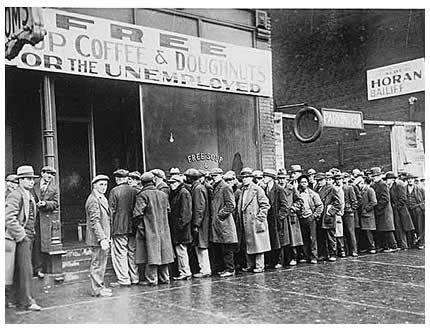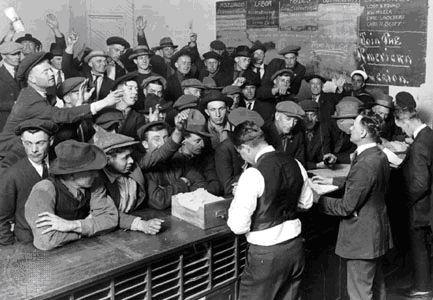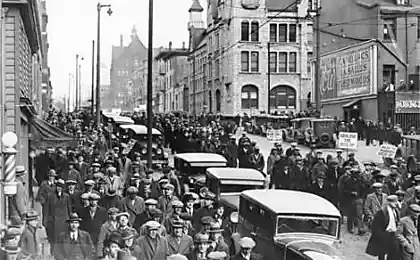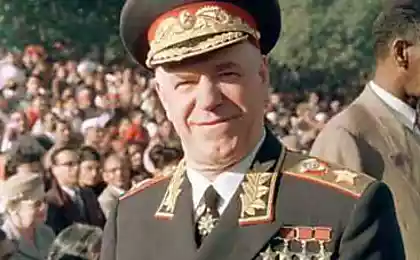1066
Read the statements by politicians during the Great Depression.
Read the statements by politicians during the Great Depression. Nothing like? :)

The Great Depression (Eng. Great Depression) - global economic recession that began in most places in 1929 and ended completely in the early 1940s.
In the Russian language more widely employed term global economic crisis, as the term "Great Depression" is generally used only in relation to the crisis in the US.
Preceded the Great Depression, the US stock market crash event 1929 .: slump in stock prices that began in "Black Thursday," October 24, 1929, accepted the catastrophic proportions in the "Black Monday" (October 28) and "Black Tuesday" (October 29). October 29, 1929 - the day the stock market crash on Wall Street.
Consequences
industrial production was driven to the level of the beginning of the XX century, that is, 30 years ago
in the West, there were about 30 million unemployed
worsened the situation of farmers, small traders, middle class. Many found themselves below the poverty line
increased the number of supporters of both levoekstremistskih (communist) and the extreme right (fascist) parties (for example, in Germany came to power Nazi Party) 25,880,507
1) "In our time, more than landslides will not." John Maynard Keynes, 1927
2) "I can not object to those who claim that we are living in a fool's paradise, and the prosperity of our country will inevitably decline in the near future." E.H.H. Simmons, president of the New York Stock Exchange, January 12, 1928
"Our permanent prosperity would never end." Myron E. Forbes, president of the "Pierce Arrow Motor Car Co.." January 12, 1928
3) "Never before has the United States Congress gathered to consider the situation in the country, do not open such a pleasant picture, as it is today. In the domestic field there is tranquility and contentment ... and the highest record of years of prosperity. In international affairs - peace and goodwill on the basis of mutual understanding. " Calvin Coolidge, December 4, 1928
4) "It is possible, quotes of securities and the decrease, but there will be no catastrophe." Irving Fisher, leading US economist, "New York Times", September 5, 1929
5) "Stock prices have reached what looks like a permanently high plateau. It is unlikely that in the near future, or even perhaps their fall by 50 or 60 points, as predicted by the bears. I think that in the coming months, the stock market will rise significantly. " Irving Fisher, Ph.D., October 17, 1929
"This fall will not have significant impact on the economy." Arthur Reynolds, president of the "Continental Illinois Bank of Chicago," October 24, 1929
"Yesterday's fall will not happen again ... I am not afraid of such a reduction." Arthur A. Losby (President 'Ekuitabl Trust Company "), quoted in the" New York Times ", Friday, October 25, 1929
"We believe that the foundations of Wall Street is not affected, and those who can afford to pay at once, cheap good stocks." Bulletin "Goodby and Company", quoted in the "New York Times", Friday, October 25, 1929
6) "Now - time to buy stocks. Now - time to remember the words of John. P. Morgan ... that any man in America, is bearish on ruined. Perhaps in a few days will bear panic rather than a bull panic. Most likely, many more years will not have such low prices for many of the shares of this hysterical selling. " R. McNeal, market analyst, quoted in the "New York Herald Tribune", October 30, 1929
"Buy a reliable, proven stocks, and you will not regret." Bulletin EA Pierce, quoted in the "New York Herald Tribune", October 30, 1929
"There are intelligent people are now buying stocks ... If there is no panic, but no one seriously believes the shares will not fall below." R. McNeal, financial analyst in October 1929
7) "The decline is in paper, and not on the real goods and services ... America is now in the eighth year of economic recovery. The previous such periods lasted an average of eleven years, that is, before the collapse is still with us three years. " Stuart Chase, American economist and writer, "New York Herald Tribune", November 1, 1929
"The hysteria on Wall Street is over." "Times", November 2, 1929
"The collapse on Wall Street does not mean that there will be any general or serious business depression ... For six years American business has been a significant part of their attention, their energy and their resources on the speculative game ... Now that irrelevant, alien and hazardous adventure is over . Business has returned home to his job, thank God, no damage, a healthy body and soul and financially stronger than ever before. " "Business Week", November 2, 1929
"... Although the stock plummeted in price, we believe that this decline - temporary and not the beginning of the recession, which will lead to a long depression ..." HES, November 2, 1929
8) "... we do not believe in a serious decline: we forecast economic growth will begin in spring and autumn the situation will become even better." HES, November 10 1929
"It is unlikely that the decline in the stock market will be long, most likely it will end in a few days." Irving Fisher, Professor of Economics at Yale University, 14 November 1929
"Panic on Wall Street will not affect most cities of our country." Paul Bloch, president of the newspaper holding "unit", editorial, November 15 1929
"It's safe to say that the financial storm is over." Bernard Baruch, a telegram to Winston Churchill, November 15, 1929
9) "I do not see the current situation is nothing threatening or causing pessimism ... I'm sure that will come in the spring revival of the economy and for the upcoming year, the country will grow steadily." Andrew W. Mellon, US Treasury Secretary, December 31, 1929
"I am convinced that through these measures we have reestablished confidence." Herbert Hoover, December 1929
"1930 will be an excellent in the number of jobs." US Department of Labor, New Year's Forecast, December 1929
10) "We share a bright future, at least for the near future." Irving Fisher, Ph.D., the beginning of 1930
11) "... there are indications that the severest phase of the recession is over ..." Harvard Economic Society, January 18, 1930
12) "Who did not worry about anything." Andrew Mellon, US Treasury Secretary, February 1930
13) "In the spring of 1930 ended a period of grave concern ... American business is steadily coming back to a normal level of prosperity." Julius Burns, head of the National Business Survey Conference under President Hoover, March 16, 1930
"... The outlook is still favorable ..." HES, March 29, 1930
14) "... the prospects of favorable ..." Harvard Economic Society, April 19, 1930
15) "Although the accident occurred just six months ago, I am convinced that the worst is over and continued unity of effort we shall rapidly recover. Banks and industry hardly affected. This danger has passed as well. " Herbert Hoover, US President, May 1, 1930
"... By May or June the spring rise should occur, which we predicted in the bulletins for November and December last year ..." Harvard Economic Society, May 17, 1930

"Gentlemen, you are late for sixty days. Depression is over. " Herbert Hoover, responding to a delegation requesting the organization of a public works program to accelerate economic recovery, June 1930
16) "... irregular and conflicting movements of business should soon give way to a sustained recovery ..." Harvard Economic Society, June 28, 1930
17) "... the current depression force is running out ..." Harvard Economic Society, August 30, 1930
18) "We are approaching the end of the declining phase of the depression." HES, November 15, 1930
19) "At this level it is possible to stabilize." Harvard Economic Society, October 31, 1931
20) "All safe deposit boxes at banks and financial institutions are sealed ... and may only be opened in the presence of the tax authorities." President FD Roosevelt, 1933

The Great Depression (Eng. Great Depression) - global economic recession that began in most places in 1929 and ended completely in the early 1940s.
In the Russian language more widely employed term global economic crisis, as the term "Great Depression" is generally used only in relation to the crisis in the US.
Preceded the Great Depression, the US stock market crash event 1929 .: slump in stock prices that began in "Black Thursday," October 24, 1929, accepted the catastrophic proportions in the "Black Monday" (October 28) and "Black Tuesday" (October 29). October 29, 1929 - the day the stock market crash on Wall Street.
Consequences
industrial production was driven to the level of the beginning of the XX century, that is, 30 years ago
in the West, there were about 30 million unemployed
worsened the situation of farmers, small traders, middle class. Many found themselves below the poverty line
increased the number of supporters of both levoekstremistskih (communist) and the extreme right (fascist) parties (for example, in Germany came to power Nazi Party) 25,880,507
1) "In our time, more than landslides will not." John Maynard Keynes, 1927
2) "I can not object to those who claim that we are living in a fool's paradise, and the prosperity of our country will inevitably decline in the near future." E.H.H. Simmons, president of the New York Stock Exchange, January 12, 1928
"Our permanent prosperity would never end." Myron E. Forbes, president of the "Pierce Arrow Motor Car Co.." January 12, 1928
3) "Never before has the United States Congress gathered to consider the situation in the country, do not open such a pleasant picture, as it is today. In the domestic field there is tranquility and contentment ... and the highest record of years of prosperity. In international affairs - peace and goodwill on the basis of mutual understanding. " Calvin Coolidge, December 4, 1928
4) "It is possible, quotes of securities and the decrease, but there will be no catastrophe." Irving Fisher, leading US economist, "New York Times", September 5, 1929
5) "Stock prices have reached what looks like a permanently high plateau. It is unlikely that in the near future, or even perhaps their fall by 50 or 60 points, as predicted by the bears. I think that in the coming months, the stock market will rise significantly. " Irving Fisher, Ph.D., October 17, 1929
"This fall will not have significant impact on the economy." Arthur Reynolds, president of the "Continental Illinois Bank of Chicago," October 24, 1929
"Yesterday's fall will not happen again ... I am not afraid of such a reduction." Arthur A. Losby (President 'Ekuitabl Trust Company "), quoted in the" New York Times ", Friday, October 25, 1929
"We believe that the foundations of Wall Street is not affected, and those who can afford to pay at once, cheap good stocks." Bulletin "Goodby and Company", quoted in the "New York Times", Friday, October 25, 1929
6) "Now - time to buy stocks. Now - time to remember the words of John. P. Morgan ... that any man in America, is bearish on ruined. Perhaps in a few days will bear panic rather than a bull panic. Most likely, many more years will not have such low prices for many of the shares of this hysterical selling. " R. McNeal, market analyst, quoted in the "New York Herald Tribune", October 30, 1929
"Buy a reliable, proven stocks, and you will not regret." Bulletin EA Pierce, quoted in the "New York Herald Tribune", October 30, 1929
"There are intelligent people are now buying stocks ... If there is no panic, but no one seriously believes the shares will not fall below." R. McNeal, financial analyst in October 1929
7) "The decline is in paper, and not on the real goods and services ... America is now in the eighth year of economic recovery. The previous such periods lasted an average of eleven years, that is, before the collapse is still with us three years. " Stuart Chase, American economist and writer, "New York Herald Tribune", November 1, 1929
"The hysteria on Wall Street is over." "Times", November 2, 1929
"The collapse on Wall Street does not mean that there will be any general or serious business depression ... For six years American business has been a significant part of their attention, their energy and their resources on the speculative game ... Now that irrelevant, alien and hazardous adventure is over . Business has returned home to his job, thank God, no damage, a healthy body and soul and financially stronger than ever before. " "Business Week", November 2, 1929
"... Although the stock plummeted in price, we believe that this decline - temporary and not the beginning of the recession, which will lead to a long depression ..." HES, November 2, 1929
8) "... we do not believe in a serious decline: we forecast economic growth will begin in spring and autumn the situation will become even better." HES, November 10 1929
"It is unlikely that the decline in the stock market will be long, most likely it will end in a few days." Irving Fisher, Professor of Economics at Yale University, 14 November 1929
"Panic on Wall Street will not affect most cities of our country." Paul Bloch, president of the newspaper holding "unit", editorial, November 15 1929
"It's safe to say that the financial storm is over." Bernard Baruch, a telegram to Winston Churchill, November 15, 1929
9) "I do not see the current situation is nothing threatening or causing pessimism ... I'm sure that will come in the spring revival of the economy and for the upcoming year, the country will grow steadily." Andrew W. Mellon, US Treasury Secretary, December 31, 1929
"I am convinced that through these measures we have reestablished confidence." Herbert Hoover, December 1929
"1930 will be an excellent in the number of jobs." US Department of Labor, New Year's Forecast, December 1929
10) "We share a bright future, at least for the near future." Irving Fisher, Ph.D., the beginning of 1930
11) "... there are indications that the severest phase of the recession is over ..." Harvard Economic Society, January 18, 1930
12) "Who did not worry about anything." Andrew Mellon, US Treasury Secretary, February 1930
13) "In the spring of 1930 ended a period of grave concern ... American business is steadily coming back to a normal level of prosperity." Julius Burns, head of the National Business Survey Conference under President Hoover, March 16, 1930
"... The outlook is still favorable ..." HES, March 29, 1930
14) "... the prospects of favorable ..." Harvard Economic Society, April 19, 1930
15) "Although the accident occurred just six months ago, I am convinced that the worst is over and continued unity of effort we shall rapidly recover. Banks and industry hardly affected. This danger has passed as well. " Herbert Hoover, US President, May 1, 1930
"... By May or June the spring rise should occur, which we predicted in the bulletins for November and December last year ..." Harvard Economic Society, May 17, 1930

"Gentlemen, you are late for sixty days. Depression is over. " Herbert Hoover, responding to a delegation requesting the organization of a public works program to accelerate economic recovery, June 1930
16) "... irregular and conflicting movements of business should soon give way to a sustained recovery ..." Harvard Economic Society, June 28, 1930
17) "... the current depression force is running out ..." Harvard Economic Society, August 30, 1930
18) "We are approaching the end of the declining phase of the depression." HES, November 15, 1930
19) "At this level it is possible to stabilize." Harvard Economic Society, October 31, 1931
20) "All safe deposit boxes at banks and financial institutions are sealed ... and may only be opened in the presence of the tax authorities." President FD Roosevelt, 1933
Woman - Sniper (7 pics + text)
How to hide an expensive car during the crisis from thieves (4 photos)























